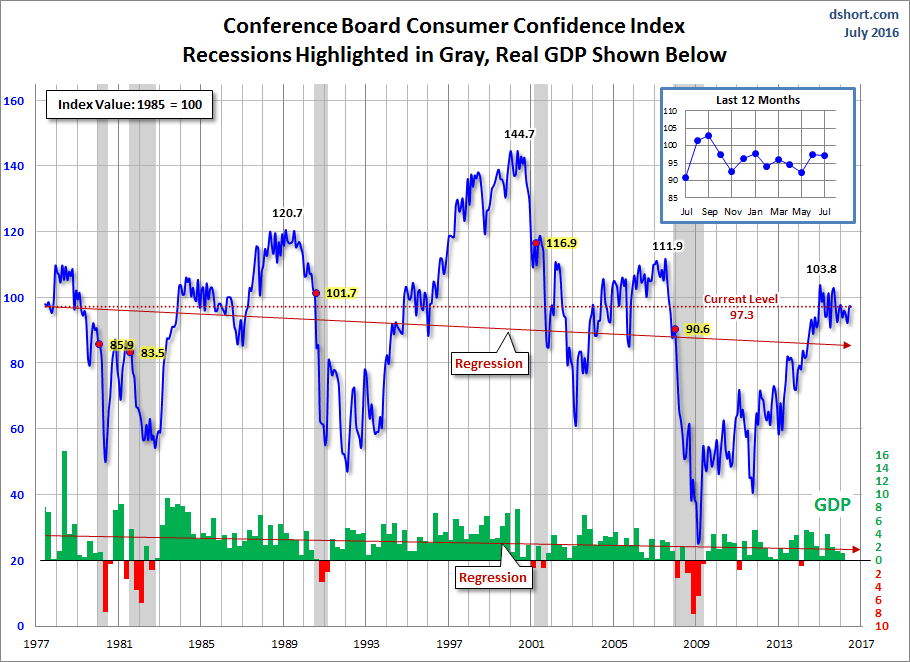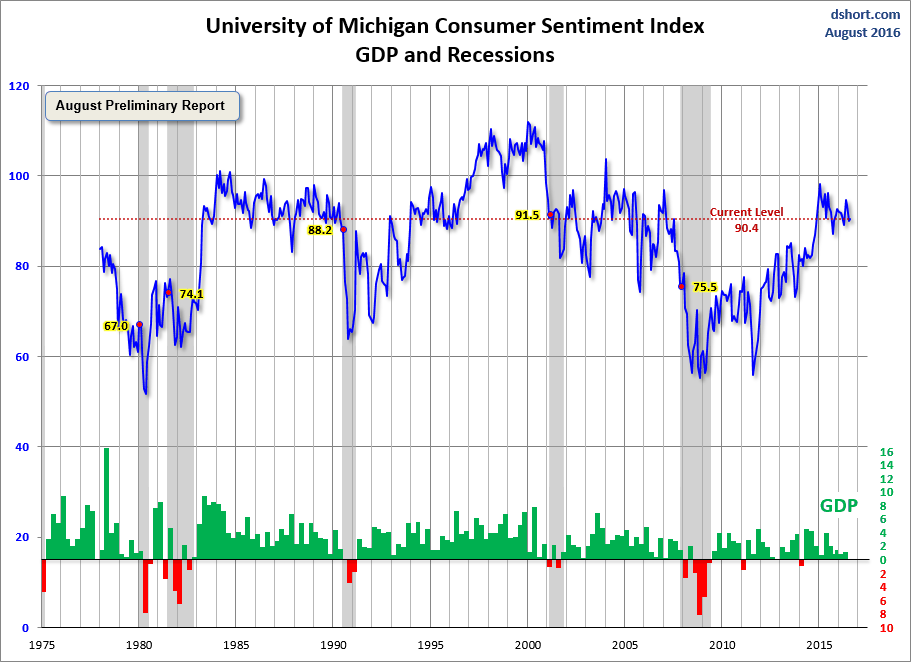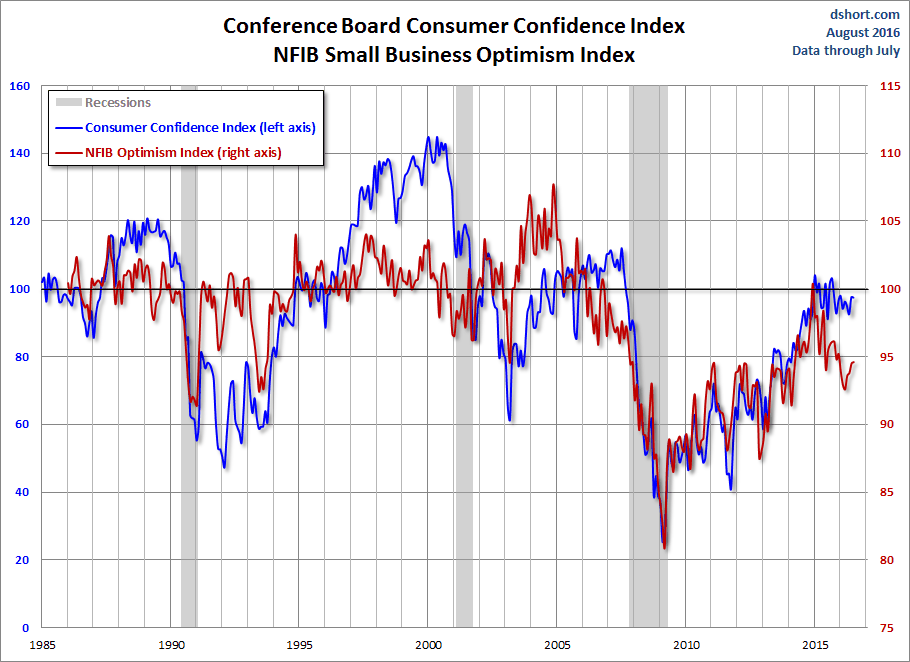Written by Doug Short and Steven Hansen
The February 2014 Conference Board Consumer Confidence Index improved after last month’s decline. The market expected this index to come in at 75.0 to 80.2 (consensus 78.4) versus the 82.3 reported.
This index still remains in territory associated with past recessions. Note that this data is considered preliminary, and the cutoff for these results was 14 March 2014.
Here is an excerpt from The Conference Board:
The Conference Board Consumer Confidence Index®, which had decreased in February, improved in March. The Index now stands at 82.3 (1985=100), up from 78.3 in February. The Present Situation Index edged down to 80.4 from 81.0, while the Expectations Index increased to 83.5 from 76.5.
“Consumer confidence improved in March, as expectations for the short-term outlook bounced back from February’s decline,” said Lynn Franco, Director of Economic Indicators at The Conference Board. “While consumers were moderately more upbeat about future job prospects and the overall economy, they were less optimistic about income growth. The Present Situation index, which had been on an upward trend for the past four months, was relatively unchanged in March. Overall, consumers expect the economy to continue improving and believe it may even pick up a little steam in the months ahead.”
Consumers’ assessment of current conditions was little changed in March. Those claiming business conditions are “good” increased to 22.9 percent from 21.2 percent; however, those claiming business conditions are “bad” also rose, to 23.2 percent from 22.0 percent. Consumers’ appraisal of the labor market was relatively unchanged. Those claiming jobs are “plentiful” decreased marginally to 13.1 percent from 13.4 percent, while those saying jobs are “hard to get” increased slightly to 33.0 percent from 32.4 percent.
Consumers’ expectations, which fell last month, rebounded in March. The percentage of consumers expecting business conditions to improve over the next six months increased to 18.1 percent from 17.3 percent, while those anticipating business conditions to worsen declined to 10.2 percent from 13.6 percent. Consumers’ outlook for the labor market was also moderately more optimistic. Those expecting more jobs in the months ahead edged up to 13.9 percent from 13.7 percent, while those expecting fewer jobs fell to 18.0 percent from 20.9 percent. The proportion of consumers expecting their incomes to grow declined to 14.9 from 15.8 percent, but those anticipating a decline in their incomes also decreased, to 12.1 percent from 13.4 percent.
Putting the Latest Number in Context
Let’s take a step back and put Lynn Franco’s interpretation in a larger perspective. The table here shows the average consumer confidence levels for each of the five recessions during the history of this monthly data series, which dates from June 1977. The latest number has moved 12.9 points above the recession mindset but remains 12.0 points below the non-recession average.
The chart below is another attempt to evaluate the historical context for this index as a coincident indicator of the economy. Toward this end I have highlighted recessions and included GDP. The exponential regression through the index data shows the long-term trend and highlights the extreme volatility of this indicator. Statisticians may assign little significance to a regression through this sort of data. But the slope clearly resembles the regression trend for real GDP shown below, and it is a more revealing gauge of relative confidence than the 1985 level of 100 that the Conference Board cites as a point of reference. Today’s reading of 82.3 is now above the current regression point of 78.2.
On a percentile basis, the latest reading is at the 35.3 percentile of all the monthly readings since the start of the monthly data series in June 1977 and at the 31.0 percentile of non-recessionary months.
For an additional perspective on consumer attitudes, see my post on the most recent Reuters/University of Michigan Consumer Sentiment Index. Here is the chart from that post.
And finally, let’s take a look at the correlation between consumer confidence and small business sentiment, the latter by way of the National Federation of Independent Business (NFIB) Small Business Optimism Index. As the chart illustrates, the two have tracked one another fairly closely since the onset of the Financial Crisis.
It will be interesting to see if the next NFIB report echoes the bounce in consumer optimism.
Caveats in Using the Conference Board’s Consumer Confidence Index
According to Bloomberg, the following caveat is provided when reviewing this series:
The underlying series for ”planned purchases” (autos, homes, and major appliances) and ”vacation intentions” showed larger increases in November 2010 levels, primarily due to sample design differences. These level shifts will be treated as breaks, and there will be no historial revisions. Neither series is included in or has any impact on the Consumer Confidence Index.The switch to the Census X-12 seasonal adjustment program produced only minor differences for both levels and month-to-month changes. As a result, The Conference Board did not find it necessary to undertake a full historical revision of the CCI time series based on the seasonal adjustment method. The restated data for November 2010, December 2010 and January 2011 (preliminary data) are based on the prior seasonal adjustment method. This index is an average of responses to the following questions: 1. Respondents appraisal of current business conditions. 2. Respondents expectations regarding business conditions six months hence. 3. Respondents appraisal of the current employment conditions. 4. Respondents expectations regarding employment conditions six months hence. 5. Respondents expectations regarding their total family income six months hence. For each of the 5 questions, there are three response options: Postive, Negative and Neutral. The response proportions to each question are seasonally adjusted. For each of the five question (above), the POSITIVE figure is divided by the sum of the POSITIVE and NEGATIVE to yield a proportion, which we call the ‘RELATIVE’ value. For each question, the average RELATIVE for the calendar year 1985 is then used as a benchmark to yield the INDEX value for that question. From 1967 to mid 1977 the CCI was bi-monthly.
This is a survey based on a probability-design random sample – conducted for The Conference Board by Nielsen. Surveys are a quantification of opinion rather than facts and data.
Observers of consumer sentiment polls should be aware they are imperfect quantifications of opinion. The question arises whether they are a rear view window or a forward looking indicator – or possibly a little of each. There is little question, however, that poor consumer sentiment corresponds to poor economic performance. Econintersect believes that consumer sentiment is mostly a coincident or lagging economic indicator.
Related Posts:
Old Analysis Blog | New Analysis Blog |
| Consumer Confidence | Consumer Confidence |












